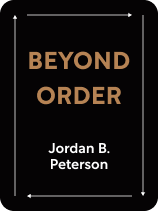

This article is an excerpt from the Shortform book guide to "Beyond Order" by Jordan Peterson. Shortform has the world's best summaries and analyses of books you should be reading.
Like this article? Sign up for a free trial here.
Do you have qualms about anything? Do they stop you, or do you end up doing things you later regret?
Everyone draws the line somewhere when it comes to things they don’t tolerate. Too often, people focus intolerance outward rather than inward. In Beyond Order, Jordan B. Peterson offers up this rule for life: Do not do what you hate.
Continue reading to learn about Beyond Order Rule 5 and how it can save you pain and regret down the road.
Do Not Do What You Hate
In life, you sometimes come up against ideas that you just can’t agree with. In Beyond Order Rule #5—Do not do what you hate—Peterson discusses how to handle these ideological conflicts when they start to compromise your sense of what’s right and wrong.
In life and work, you’ll sometimes find yourself in positions that compromise or challenge your morals. For instance, you might disagree with workplace policies to ban certain words or impose particular behaviors for ideological reasons. If you accept these situations, Peterson says, you’ll become passive and, over time, suffer from repressed emotions. Specifically, you’ll experience inner emotional conflict and struggle to respect yourself. That is, since you failed to stand up for what you thought was right, you won’t be able to see yourself as morally upright or respectable.
(Shortform note: While Peterson’s advice may help you maintain personal integrity, note that it may put your career at risk. In their 2016 book The Stupidity Paradox, André Spicer and Mats Alvesson explain how the most successful employees are those that conform to company standards rather than challenge them. In fact, employees that push limits, challenge norms, or think outside the box may be seen as problematic. So before you get in an ideological fight with your boss, consider whether you’re financially ready to risk your livelihood.)
To avoid this fate, equip yourself to combat policies or impositions with which you take great issue. Peterson recommends two strategies:
- Improve your skills. Find opportunities to build transferable skills so that, if your job is at risk, you can pivot your career in a new direction.
- Educate yourself. Get to know both sides of the issue in question so that you can voice your qualms intelligently. Develop your own argument so that you can articulate it smoothly.
If you take up the fight and it goes poorly, these strategies will have you prepared to pivot and stay employed. If it goes well, you’ll have honored your inner moral instinct and grown as a person.
| Be Prepared to Pivot, but First Avoid Entrenching Your Beliefs Peterson’s advice to build transferable skills is supported by experts such as David Epstein, who argues in Range that specialists are a dying breed. Highly specialized skills are less useful in our increasingly complex, fast-paced world. In contrast, generalists—people who build a wide range of transferable skills—may find greater success. Generalists are often more creative and better at solving problems they’ve never encountered, both traits that are valuable to fast-moving enterprises. Such preparation may work wonders, but there may be an easier route: Examine whether you’re giving the opposing position a fair shake before you risk your job over an ideological disagreement. In Think Again, Adam Grant argues that we’re all prone to biases and incomplete information, such that our beliefs often stand on shaky ground. Given this, reconsidering your stances may expose that what you believe to be right is biased or incomplete. In such a situation, you might choose to listen to the other side and consider whether you might be in the wrong. This can also help you develop self-awareness and intellectual humility, qualities that help you continue to develop more precise, unbiased knowledge. |

———End of Preview———
Like what you just read? Read the rest of the world's best book summary and analysis of Jordan Peterson's "Beyond Order" at Shortform.
Here's what you'll find in our full Beyond Order summary:
- A no-nonsense guide to navigating the chaos of our difficult world
- How and why you should listen to your conscience
- How to show up for life as fully as you can






